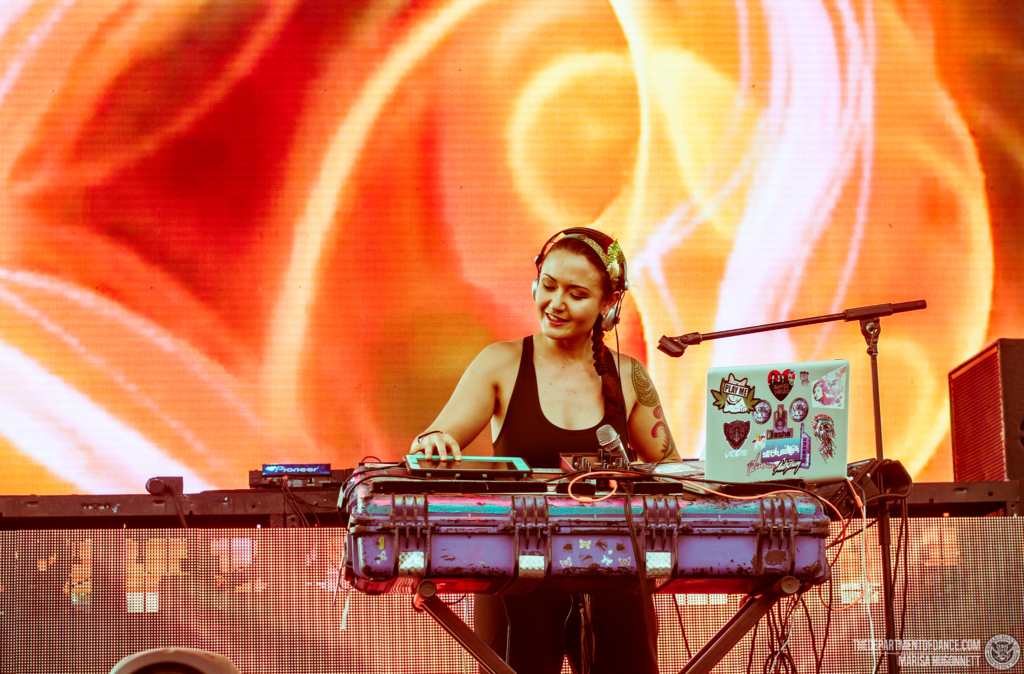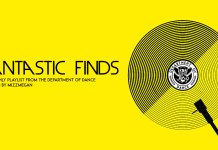There just aren’t enough positive influences in the world. That’s a fact. Not just for women, but for humans in general.
EDM is no longer a landscape of antics, gimmicks, formulaic compositions, and the same-old predictable presentation of music. It can’t be to survive. The artists that will continue to push the genre and make it better are doing more than creating bangers and playing them in Vegas-style clubs. Maybe you haven’t heard of Ill-Esha, maybe you have, but either way, your perspective on what’s possible in electronic music production is about to change. Artists, take note.
I was able to catch up with Ill-esha for an interview over Euphoria weekend. On first impression, she’s professional and enthusiastic. She’s also really friendly, and I get the impression right away that she’s incredibly fan-friendly.
A: Welcome to Euphoria Fest! I’m really looking forward to your set. I read that you’re really into nature and science; how do you feel about this festival?
I: Yeah, festivals are my favorite place to perform because of that—because you have the juxtaposition of being out in the middle of nature with having all the new technology and presenting the newest, freshest music to people.
A: Yes! And on the topic of newest and freshest, you started out in drum and bass, and now you’re moving into this future, almost vaporwave style.
I: I’ve always, as a piano player and vocalist, used a lot of big chords and vocals, so I kind of feel like music now is naturally following these trends, and it’s fantastic.
A: So you’re seeing a movement from more of a rhythmic thing to the more melodic?
I: Yeah, you know I think for a while as far as song production goes, I was so fascinated with the technology that I was making ‘back in the day’ hyper-edited stuff. And then I gradually found new ways to get a soft bass and melodic songwriting methods. That, I don’t think, will ever go out of style, songwriting. It’s just kind of coming back together as bass has influenced the underground and vice versa.
A: And in production, you’ve actually built your own studio.
I: I build a lot of things! I like to know what I’m doing always, so I’m just really fascinated by how things work. I started building my own computers when I was young, and all the stuff I use for my shows, I put together. I’m inspired by people who push harder and do more and challenge what we have available to use.
A: That’s definitely an innovative frame of mind. You run the electronic music production discord—how did that get started?
I: It’s something that I’ve been doing for a while, and it’s a passion of mine. I got into it because I know there are a lot of people out there that don’t necessarily have access to the scene, a PR person, or any of these tools that we all use in the industry. They’re kids who are in their parent’s basements, or some of them don’t have a lot of real-life friends, they’re shy, and they’re hanging out by chatting on the internet. I was one of those kids. So it’s really important to me to be that kind of mentor now and give back. It’s great to give these kids a chance to shine, and a lot of their music is really worth developing.
A: We’ve been bringing more attention to women in EDM this year, and I’m sure you’re aware that there’s a gap in women versus men producers. So it’s really exciting to see you take such a leadership role in production and giving light to talent that maybe doesn’t have access to the same things. Have you noticed an increase in women coming forward into the music business?
I: You know, a lot of aspects about the music business, especially the business, I see a lot of powerful women working on PR, management, photography, promotions, kind of pulling into these normal channels, but I still don’t see a lot of women in production. It’s puzzling, and I argue with my guy friends all the time—is it biology, is it social conditioning, is it whatever—but I think these are all generalizations. I think a lot of people learn in a relatable way, myself included. I want to know why something works, not just how, and I want to know how it relates to what I’m thinking about and what I want to do. I want the technical knowledge in this fashion, which is more of a stereotypical dude thing. I think that if there were more teaching methods presenting this that perhaps you would get new demographics, but it’s a Catch-22 because there isn’t enough. I realized as I put out my first production tutorial that there aren’t many technical tutorials with women. It’s just not a thing I’ve seen, and so I’m hoping that maybe if I keep putting out things explaining what I’m doing and how things work, maybe gradually it’ll just assimilate until it’s not a thing.
A: Yes! Exactly—getting past the point of, ‘Look! It’s a woman doing this thing!” and it’s just a natural part of it. Not too different from the gaming world. You also composed for games.
I: Yes, a few, actually, little things like apps and stuff, but right now I’m learning more about video game coding so I can really get inside and make the right sounds and music. I have to know so much about what I love, and it’s just another aspect that I’m exploring.
A: Is it a different process to compose for that versus a studio album?
I: Oh, absolutely. The fascinating dimension I’m learning with games is that, with music is that you move through time with your imagination, and with a game, it’s a more interactive set of features that you’re depending on what the person is doing, and so the music will change. So you have to cater to, essentially, an extra dimension of mood and free choice and movement. It’s like scoring a movie, but in real time, and you choose your own ending.
A: Do you have any instruments or production methods that you gravitate toward when composing?
I: I’ve been a piano player since the age of 4, so ultimately, everything takes place on the keys for me, even when I’m banging drums or on other instruments. I can tap something out much faster than I can draw it, so I think that the way that a piano player articulates things will always flow through my music. That being said, I really like to shake up patterns, so I’m constantly putting myself in the hot seat and challenging myself—‘OK, today you have to clip this in, today you have to use this plugin you don’t understand, today here’s your uncomfortable spot,’ because I think that’s how you get better.
A: What’s your advice for artists pursuing music?
I: Between running the server and speaking to thousands of kids, and people of all ages, really, it’s hard to say because we’re in this ultimate peak saturation, where the technology is available for anyone, which is great, and that means a lot of stuff is being made; there’s also knowledge available. So, at this point, what’s standing out is you as a human, presenting your personality and your character and you have to be an entire thing. And it’s a lot, especially for people who are introverted and have this inclination to sit in front of their computer in the first place.
But you know, that’s sort of what music is. Your personality is your flagship and your music is kind of like the party that comes with you. As an introvert, I would just say that everybody has to find that little aspect that they can engage the world with, whether you’re funny, or you’re just really thoughtful, or maybe you draw pictures, or some quirk that makes you, you. Find purpose and don’t be afraid to figure out what your core values are, and let them define you. A long time ago I took an interest in my health, and a lot of new ideas I have for videos involve stretching for producers, or cooking shows for DJs who are never at home. And you know, just fun ways of presenting not just partying beyond health, but hey, you can actually enjoy this music and take care of your body and your mind as well.
A: Love it! Thanks so much for your time!
Watching her perform is definitely a lesson in making musical talent versatile and compelling. I had the pleasure at Euphoria Fest. While waiting at the Elements stage for her set to begin, I noticed the crowd wasn’t too big; I can absolutely conclude that this is a matter of Sunday being Sunday and everyone getting started after sun-down, since that was the story across the board. That’s not really a litmus test, in my opinion. What matters is a musician’s ability to draw a crowd, and that is exactly what Ill-Esha did.
I knew that she sings in her live sets. But there’s always a bit of skepticism; is her singing a gimmick? Does she actually have a good voice? Can she control the strength and pitch? Absolutely. She’s legitimately a singer. It’s not a gimmick; the woman has pipes, and she knows what to do with them. This made her performance one of the most exciting and inspiring of the weekend, in my opinion. She’s a one-woman force, a DJ, a singer, and the fucking coolest person I’ve ever seen playing a keytar, which is a feat in and of itself.
Her sound is forward-thinking, and for good reason. She’s a pioneer in the bass music world, pushing the boundaries of genres and unafraid to experiment. Ill-esha is currently exploring future bass and vaporwave, producing melodic musical journeys that capture the imagination with high notes and vocals, and grabs you by the gut with the bass and percussion. I almost feel like I’m in a fantasy world when listening to her music, and I think for where she is right now creatively, that’s kind of the point.
Are you inspired yet? Good. Now listen to her amazing music.
Ash Cash Dillon is a legit word nerd with a killer bass face and a love of all that is stone cold groovy. You can find her writing all over the interwebs, business world, and take-out menus via sharpie vandalism.




